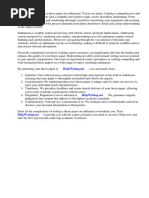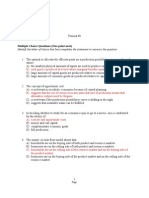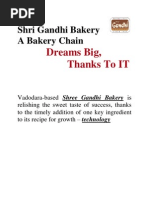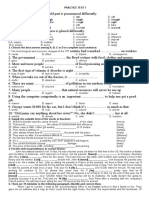English Creative Response Task
English Creative Response Task
Uploaded by
muso1909Copyright:
Available Formats
English Creative Response Task
English Creative Response Task
Uploaded by
muso1909Copyright
Available Formats
Share this document
Did you find this document useful?
Is this content inappropriate?
Copyright:
Available Formats
English Creative Response Task
English Creative Response Task
Uploaded by
muso1909Copyright:
Available Formats
Euthanasia - a
Life-changing
Decision
A recent debate has emerged
throughout Canberras public
following the arrest of Dr Philip
Nitschke.
From primary school students to
federal politicians, eeryone seems
to hae something to say about the
issues surrounding euthanasia and
the other arious forms of suicide.
!uthanasia is generally seen as a
"uiet, painless death. #t is also
known less formally as mercy killing,
and as far as legal definitions it is
broken down into seeral sections$
Passive euthanasia occurs when a
doctor alters treatment to allow death
to occur naturally, eg. stopping #%
fluids&medication. #n some
circumstances, passie euthanasia
can be iewed as legal.
Active euthanasia is the process of
actiely participating in a fatal act,
usually at the re"uest of the patient.
'his form includes the use of a lethal
in(ection.
'here is also physician-assisted
suicide, which is a cross between
passie and actie euthanasia. A
licensed practitioner knowingly gies
a thoroughly informed patient the
means with which they could commit
suicide, but the patient actually
completes the action.
'he fourth and final type of
euthanasia is involuntary
euthanasia, which is only done for
the critically ill who hae little to no
hope of eer recoering. #t is often
re"uested by a family member or
suggested by a doctor.
)# really dont understand why people
cant be free to make their own
decisions,* commented Carlissa
+teens, a year si, student. )#ts their
life - it should be their choice.*
.any people agree with this
comment, realising that in a life/or/
death situation they may not be
granted the right to this choice.
+till, many more disagree, arguing
that despite this their doctor would
know best.
#s there really a right answer to this
debate0 Paul 1aniel thinks not.
)2ou cant really hae a definitie
personal iew until youe
e,perienced it, and een then its
your own personal opinion, not
necessarily that of the society in
general.*
1aniel, a 34 year old paraplegic,
speaks from e,perience. At the age
of 56, he lost the use of both legs
after an e"uestrian accident.
7oweer, his iews on the right to
choose life or death hae changed
oer the years.
)8hen # first woke, # wanted to die. #
figured there wouldnt be anything to
help me9 # wanted to be put out of my
misery.
)'hen they started e,plaining how
much # could still do, what # could
ad(ust to fit my new re"uirements.
:ooking back on it now, # can see
why its so great that they didnt let
me decide.*
Letters to the Editor
Madam,
Euthanasia is such a
controversial issue, but really,
why make such a fuss out of it?
Its pretty clear that while many
may consider euthanasia, they
are often thoroughly depressed
and are thinking with an
irrational mind. Depressed
persons often make decisions
regarding many aspects of their
life which they come to regret
later. Death is not something
that can be undone and the one
who dies is not around to feel
the repercussions.
!he law is clearly against it, with
some areas imposing murder
charges against those who
participate. Many religions are
against it too " #hristianity and
$uddhism, for e%ample. &hy
encourage people to go against
their faith, against their beliefs?
'verall, I (nd it disheartening
and cruel to promote such a
worthless issue which can only
bring heartache and pain to our
society.
!o &hom It May #oncern,
)ustralia is known for being one
area of the world where people
are given much freedom in
regards to their actions and
words. &hy, then, are we unable
to e%tend this privilege to
euthanasia?
*enerally, euthanasia is seen as
acceptable in modern medical
societies. &hilst it is not actively
encouraged, doctors who
believe it is in the patients best
interests and are willing to work
with the patient are often able
to continue without fear of
recrimination from that social
group.
+urthermore, in many situations
families are granted the option
to turn of life,support or ask that
a family member is not
resuscitated again. -aving
personally e%perienced this
situation with my mothers
death, I am at a loss to
understand why a family can
make this decision but another
individual a.ected cannot.
I (nd it overwhelming that this
issue receives so much negative
press. It is only, after all, a
decision, however contentious it
may seem. It is the right of the
individual to make this decision,
and while other professionals
may have opposing views they
must learn to respect the choice
of the patient or family in all
circumstances.
Whos Really
Deciding?
'he issue of euthanasia has
prooked a lot of discussion oer the
last few weeks, particularly since the
edges are definitely not clear cut.
:ooking upon last weeks court case,
where .r :onneth won the right to
leae the hospital and die at home
surrounded by his family, it seems so
unrealistic to hae to debate it.
.r :onneths doctors all agreed that
there was no real hope of a full
recoery. #n this situation, isnt it right
for the patient to hae the right to
deny treatment and do what they can
with their time0
'here are, of course, situations
where the patient is able to make a
full recoery. .any people would
argue that in this conte,t euthanasia
is inappropriate.
'he difference between the two
situations$ the "uality of life.
;uality of life is an important aspect
to the issues surrounding
euthanasia. 'here is no point in
keeping someone alie if they are
bedridden and completely
incompetent, not een able to
communicate.
<n the other hand, if an acceptable
"uality of life can be established,
then what reason is there to destroy
it0
8hen animals are put down, they
leae grief, sadness and a sense of
loss with us. 7oweer, we are also
left with the knowledge that they are
no longer suffering. 8hy are we
unable to look at human euthanasia
in the same light, and accept that
sometimes we must be cruel to be
kind0
'here are always situations where
there is a choice between life and
death. 8hat should be taken into
account is the circumstances
surrounding both that particular time
and the future for the patient and the
"uality of life that is achieable.
You might also like
- The Fathers of The Church A New Translation Volume 115 PDFDocument328 pagesThe Fathers of The Church A New Translation Volume 115 PDFRemon100% (2)
- Speech Outline EuthanasiaDocument6 pagesSpeech Outline EuthanasiaHashma Khalid100% (2)
- EuthanasiaDocument3 pagesEuthanasiaMacen50% (2)
- The Psychology of Nirvana Johansson 1969Document136 pagesThe Psychology of Nirvana Johansson 1969Shaswata PanjaNo ratings yet
- Euthanasia DebateDocument3 pagesEuthanasia DebateNicole Andrea TuazonNo ratings yet
- Euthanasia: Project ReportDocument6 pagesEuthanasia: Project ReportUmar DarNo ratings yet
- Argumentative Thesis Statement On EuthanasiaDocument5 pagesArgumentative Thesis Statement On Euthanasiazuhemad0g0n3100% (1)
- Arguments Against EuthanasiaDocument14 pagesArguments Against EuthanasiaAmit Pratap Singh100% (1)
- Claret College of Isabela Roxas Avenue, Isabela City Senior High School UnitDocument5 pagesClaret College of Isabela Roxas Avenue, Isabela City Senior High School UnitAMIDA ISMAEL. SALISANo ratings yet
- Mercy KillngDocument2 pagesMercy KillngMarian CastorNo ratings yet
- Final Draft Comp IIDocument5 pagesFinal Draft Comp IIapi-253716170No ratings yet
- EssayDocument3 pagesEssayTribal DragonNo ratings yet
- Euthanasia PaperDocument6 pagesEuthanasia Paperapi-313102357No ratings yet
- Term Paper EuthanasiaDocument8 pagesTerm Paper Euthanasiac5qdk8jn100% (1)
- Stand On EuthanasiaDocument3 pagesStand On EuthanasiaNLynne GinezNo ratings yet
- In Comparison To Other Countries.Document4 pagesIn Comparison To Other Countries.Thomas JohnstonNo ratings yet
- Euthanasia DissertationDocument7 pagesEuthanasia DissertationBuyAPaperOnlineSingapore100% (2)
- Death With Dignity EssayDocument8 pagesDeath With Dignity Essayapi-3169800490% (1)
- Euthanasia Thesis AgainstDocument6 pagesEuthanasia Thesis Againstgbvhhgpj100% (2)
- Classification of EuthanasiaDocument4 pagesClassification of EuthanasiaAditi SinghNo ratings yet
- EuthanasiaDocument12 pagesEuthanasiaEftiemdigNo ratings yet
- Legalization of EuthanasiaDocument9 pagesLegalization of EuthanasiaDaniel Sabori HerreraNo ratings yet
- Assisted Suicide Essay ThesisDocument6 pagesAssisted Suicide Essay ThesisTracy Hill100% (2)
- Thesis EuthanasiaDocument6 pagesThesis Euthanasiamarilynmarieboston100% (1)
- Euthanasia Term Paper FreeDocument6 pagesEuthanasia Term Paper Freeafmabhxbudpljr100% (1)
- EUTHANASIADocument19 pagesEUTHANASIAMaureen Kate DuqueNo ratings yet
- Euthanasia Would Not Only Be For People Who AreDocument3 pagesEuthanasia Would Not Only Be For People Who Arem__saleemNo ratings yet
- The Debate: Wouldn't Do All That You Are Doing and Would Allow Her To Die Peacefully"Document9 pagesThe Debate: Wouldn't Do All That You Are Doing and Would Allow Her To Die Peacefully"Aekagra SaxenaNo ratings yet
- CCCC C C C C CCCCCCDocument7 pagesCCCC C C C C CCCCCCPreston Peter GagneNo ratings yet
- Information Effect ProjectDocument9 pagesInformation Effect Projectapi-355098613No ratings yet
- Euthanasia: Euthos (Easy) + Thanos (Dying)Document31 pagesEuthanasia: Euthos (Easy) + Thanos (Dying)Subhadip MurmuNo ratings yet
- Should There Be A Right To Die? Yes, No Maybe Don't KnowDocument9 pagesShould There Be A Right To Die? Yes, No Maybe Don't KnowArshiyaNo ratings yet
- Ethics Sa3Document2 pagesEthics Sa3Ekay OrsolinoNo ratings yet
- Arguments Against EuthanasiaDocument17 pagesArguments Against EuthanasiaEcia Hanama SimbolonNo ratings yet
- Euthanasia Term Paper IntroductionDocument7 pagesEuthanasia Term Paper Introductionea8dpyt0100% (1)
- Euthanasia DefinitionsDocument37 pagesEuthanasia DefinitionsAi RouNo ratings yet
- Euthanasia Term PaperDocument6 pagesEuthanasia Term Paperea8r2tyk100% (1)
- Euthanasia: Is It Justified?Document5 pagesEuthanasia: Is It Justified?Janna NotoNo ratings yet
- Dissertation EuthanasiaDocument4 pagesDissertation EuthanasiaPayToDoMyPaperPortland100% (2)
- EuthanasiaDocument2 pagesEuthanasiaFristhinaMaharaniNo ratings yet
- Arguments Against EuthanasiaDocument3 pagesArguments Against EuthanasiaThassia Salvatierra100% (1)
- C Introduction About The Topic: 2) Opinions Against of Mercy KillingDocument3 pagesC Introduction About The Topic: 2) Opinions Against of Mercy KillingJulian YmasaNo ratings yet
- Euthanasia EssayDocument3 pagesEuthanasia Essayapi-506809307No ratings yet
- Bueno Michel Angelo FINAL PAPERDocument2 pagesBueno Michel Angelo FINAL PAPERVince Lorvin GarilloNo ratings yet
- Euthanasia Dissertation TitleDocument7 pagesEuthanasia Dissertation TitleCheapPaperWritingServicesOmaha100% (2)
- Euthanasia Essay DraftDocument6 pagesEuthanasia Essay Draftapi-317907441No ratings yet
- Euthanasia Thesis ProDocument8 pagesEuthanasia Thesis Promiamaloneatlanta100% (2)
- English SpeechDocument6 pagesEnglish SpeechDavide InvernizziNo ratings yet
- Terminally Ill, Close To Death and Suffering Beyond Any Medical HelpDocument2 pagesTerminally Ill, Close To Death and Suffering Beyond Any Medical HelpDaizelle Ann AngadolNo ratings yet
- Mercy KillingDocument3 pagesMercy KillingAleena KhanNo ratings yet
- Should Active Euthanasia Be Legal?Document6 pagesShould Active Euthanasia Be Legal?Sarah McMahonNo ratings yet
- Assisted Dying - Ending Life: Aindre Reece-Sheerin Mars 2018Document11 pagesAssisted Dying - Ending Life: Aindre Reece-Sheerin Mars 2018AindreReece-sheerinNo ratings yet
- Euthanasia: Mercy KillingDocument4 pagesEuthanasia: Mercy KillingAli SirNo ratings yet
- 7 Important Euthanasia Pros and ConsDocument2 pages7 Important Euthanasia Pros and ConsChristian ArbolerasNo ratings yet
- EuthanasiaDocument6 pagesEuthanasiaIsidora RiveraNo ratings yet
- Active Euthanasia ThesisDocument4 pagesActive Euthanasia Thesislauriegunlickssiouxfalls100% (1)
- Thesis Paper On EuthanasiaDocument5 pagesThesis Paper On Euthanasialidzckikd100% (1)
- Consti ResDocument12 pagesConsti ResAdityaNo ratings yet
- Euthanasia Thesis Statement ExamplesDocument8 pagesEuthanasia Thesis Statement Examplesnicoleyoungaurora100% (2)
- EuthanasiaDocument2 pagesEuthanasiaArish VinluanNo ratings yet
- EuthanasiaDocument6 pagesEuthanasiajanepriceNo ratings yet
- Asthma Action Plan TemplateDocument2 pagesAsthma Action Plan Templatemuso1909No ratings yet
- Week 1 - Myspace - 6-3-07Document3 pagesWeek 1 - Myspace - 6-3-07muso1909No ratings yet
- Shade EssayDocument3 pagesShade Essaymuso1909No ratings yet
- Willow Tree and Olive EssayDocument2 pagesWillow Tree and Olive Essaymuso1909No ratings yet
- Shine Jesus ShineDocument1 pageShine Jesus Shinemuso1909No ratings yet
- BreatheDocument1 pageBreathemuso1909No ratings yet
- Guide To Setting Goals: Goal Statements To Avoid Comments More Specific GoalsDocument2 pagesGuide To Setting Goals: Goal Statements To Avoid Comments More Specific Goalsmuso1909No ratings yet
- Name - Grade - Height - Hair Color - Voice PartDocument2 pagesName - Grade - Height - Hair Color - Voice Partmuso1909No ratings yet
- Towards A Theory of Japanese Social Structure An Unilateral SocietyDocument20 pagesTowards A Theory of Japanese Social Structure An Unilateral Societyshahadat115No ratings yet
- Description of Route in This Timetable Route 961: Barden Ridge To MirandaDocument12 pagesDescription of Route in This Timetable Route 961: Barden Ridge To MirandaSpam UsNo ratings yet
- Cross Rates - November 28 2018Document1 pageCross Rates - November 28 2018Tiso Blackstar GroupNo ratings yet
- Mock Interview SlipDocument1 pageMock Interview SlipIan JamesNo ratings yet
- House Plants of GorDocument2 pagesHouse Plants of Gormrbig7002No ratings yet
- Detailed Lesson Plan in ABMDocument5 pagesDetailed Lesson Plan in ABMAnonymous QZsOxQsJNo ratings yet
- Paramita - Manuscript Template 2021Document5 pagesParamita - Manuscript Template 2021kuswonoNo ratings yet
- United States v. Bernard Gaines, 436 F.2d 1069, 2d Cir. (1971)Document2 pagesUnited States v. Bernard Gaines, 436 F.2d 1069, 2d Cir. (1971)Scribd Government DocsNo ratings yet
- Desain Pencacah Serabut Kelapa Dengan Penggerak Motor ListrikDocument9 pagesDesain Pencacah Serabut Kelapa Dengan Penggerak Motor ListrikDwi FranNo ratings yet
- 14 - Moot Problem 14Document3 pages14 - Moot Problem 14MLGNo ratings yet
- Capital Structure and Financial Performance: Evidence From IndiaDocument17 pagesCapital Structure and Financial Performance: Evidence From IndiaanirbanccimNo ratings yet
- Investment Policy Analysis of Commercial Banks: (A Comparative Study of Himalayan Bank Ltd. & Nepal SBI Bank LTD.)Document169 pagesInvestment Policy Analysis of Commercial Banks: (A Comparative Study of Himalayan Bank Ltd. & Nepal SBI Bank LTD.)devi ghimireNo ratings yet
- Michel CamiloDocument6 pagesMichel CamilokNo ratings yet
- Jose Ramon CarcellerDocument49 pagesJose Ramon CarcellerCentSeringNo ratings yet
- Takwim Tahunan 2024..Document4 pagesTakwim Tahunan 2024..Faraulah TvNo ratings yet
- State Attorneys General LetterDocument7 pagesState Attorneys General LetterThe Western Journal100% (1)
- Tutorial #1 With AnswersDocument10 pagesTutorial #1 With AnswersregoleNo ratings yet
- The Shared ScoresDocument5 pagesThe Shared ScoresJoseph SharonNo ratings yet
- Administrative Law Notes KenyaDocument10 pagesAdministrative Law Notes Kenyacharless madwagoNo ratings yet
- Cause and Effect EssayDocument2 pagesCause and Effect EssayPan YoonNo ratings yet
- Class - 4 English Book - Word Meanings SysnonymsDocument4 pagesClass - 4 English Book - Word Meanings SysnonymsPriyanka VermaNo ratings yet
- Final Project On MR PuffDocument12 pagesFinal Project On MR Puffttpatel02No ratings yet
- ArticlesDocument2 pagesArticlesYhancie Mae TorresNo ratings yet
- Practice Test 7 Section I: Lexico-GrammarDocument5 pagesPractice Test 7 Section I: Lexico-GrammarTrần HuyNo ratings yet
- Blue Book Resistance TablesDocument3 pagesBlue Book Resistance TablesLuuvan DongNo ratings yet
- 130 1 Application FormDocument2 pages130 1 Application Formhrocking1No ratings yet
- Code On Social Security, 2020Document11 pagesCode On Social Security, 2020Abdul Hudaif100% (1)
- Topic 2.eimDocument9 pagesTopic 2.eimEmmanuela IgnacioNo ratings yet

































































































